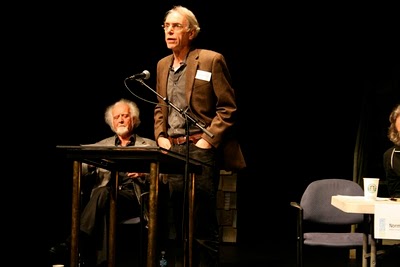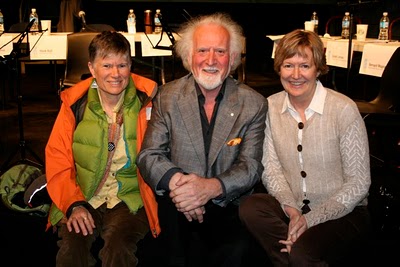Vancouver 2050 Address
May 27, 2010
On April 24, 2010, PuSh Executive Director Norman Armour and PuSh Board Member Max Wyman participated in Vancouver 2050: Creative City, a forum called to envision the city of Vancouver as a creative city in the year 2050. The session lasted four hours and was well-attended by more than a hundred leaders of arts and culture from Greater Vancouver and the Lower Mainland.
This is the address that Norman gave:
“I must admit that Iʼve never been much of a futurist. Woefully inept at predicting new forms of space travel, advancements in technology, or seismic shifts in the environment —social or natural. Though I may read science fiction from time to time, my preference has been Vonnegut rather than Bradbury, Cormac Mccarthy rather than Robert Heinlein.
 Personally, the notion, the idea (even “ideal”) of a future has too often been presented as if it were something out there—something beyond grasp, disconnected from human agency; something I should be aware of (or ignorant at risk of not being in the know); something I should prepare for, or be at risk of being swept aside by events and forces to come.
Personally, the notion, the idea (even “ideal”) of a future has too often been presented as if it were something out there—something beyond grasp, disconnected from human agency; something I should be aware of (or ignorant at risk of not being in the know); something I should prepare for, or be at risk of being swept aside by events and forces to come.
I was talking to a friend lately about this question of the future and Vancouver in 2050. We both agreed to a simple premise: the future is now. The science fiction writer William Gibson shares this view. He has asserted that he does not write about the “future.” He writes about now.
This approach to the question of what is our cityʼs future, of what things look like in 2050, is something I can grasp, something I can hold myself accountable for, something I can envision, and something I can have a stake in and have a sense of agency in creating. Because for me, if the future is to be relevant, to have meaning, it must be something with which I am not only involved in, it must also be something I for which I am also responsible.
Take a look around: ask yourself what is the current state of all things cultural? What is occurring that excites you? Alternatively, what is not occurring? Where are the gaps? What is happening in our city culturally that you wish to see more of? And what is not happening that you wish to see come into existence. Most importantly, how could you play role in changing the situation, in creating new conditions, a new context. This is for me the real question—as an artist, as a cultural worker, as executive director of the PuSh International Performing Arts Festival, and as a citizen of this city.
When Katrina Dunn and I conceived of PuSh way, way, way back in 2000 or so—at the turn of the century—we were simply imaging something that we wanted to occur, something we currently did not see around us, something that we believed was latent and that might change the environment, that might alter and improve the context in which we were producing theatre at the time. (And we werenʼt the only ones having such thoughts.) We wanted to change the conditions in which our colleagues and us were creating work, and ultimately the conditions under which the performing arts were being received and viewed by audiences, other artists, the media, public funders and the private sector.
We wanted to raise the bar.
We wanted a new horizon.
We wanted to break down the silos between audiences and between disciplines.
We wanted to see more work from Canada and abroad.
We wanted more work from Vancouver to travel outside the city.
We wanted more rigour.
We wanted a deeper lever of critical evaluation.
We wanted more conversation, more dialogue.
We wanted more audiences.
We wanted more diverse work.
We wanted a different context.
And we were not the only ones.
Did we succeed? Have things changed for the better? Is the context different in any measurable, meaningful way? For the most part, I think so. To what degree, Iʼll let others opine.
The late avant-garde theatre practitioner Joseph Chaikin was asked why he and other members of the Open Theater had not written down the various in-studio techniques and findings that led to the groundbreaking work they created. His reply was simple: We had a very particular set of questions that we were attempting to answer. They were our questions and the answers were too. Why would they have relevance otherwise? The implication being, if you want real answers, come up with your own questions?
Take a look around Vancouver and itʼs cultural scene. What do you see? What is there that makes you curious? What intrigues you, perhaps excites you, or even inspires you? In other words, what trends are you drawn to?
I bet if you think it through fully, you will find something (an initiative, a piece of work, an aesthetic, an individual artist, a particular organization) that shares certain aspects, characteristic and attributes with a work, artist or organization in another city or cultural milieu. And if you think it through even further, I bet you will discover what is slightly different, even unique—a slightly different bent, that is particular to this city, its history, people, artistic preoccupations, imagination, and to its particular conditions and context of Vancouver past, present and even future.
Take another look around this city. What is not here that you wish was. What is not yet a trend, but could become one if things only gathered steam? What might be possible if only enough people saw the need for it, imagined it possible, envisioned it as the “future”?
Risk is parlayed around these days, almost as much as innovation is. I find the word risk too often overstated, something to easily put out there to justify and prepare for the unimaginable: i.e., failure. I do believe in the notion of future, but only under certain conditions. Something truly consequential has to be at stake; and the higher the stakes, the greater the risk.
Hereʼs a something to risk: what if you were to want something to change, or to come into existence, or to grow and flourish within our cultural scene? And then you set out to do everything you could to be an agent of change and to help make it happen, because the sense of loss and despair you feel when imagining the opposite is too great. And five, ten, or thirty years later your worst fears are realized. The future is not what you imagined, not what you strived so hard for; it turns out not to be the case. Could you live with such a loss and sense of failure? Could you live with that world? Could you live in such a city? In what are unquestionably challenging times, this is the real risk swirling around the question of Vancouver in 2050.
The future is now. It is within our reach. The future is ours to imagine and to fashion.”
Norman Armour
Executive Director
PuSh International Performing Arts Festival
Photos by Tom Hudock

View the official transcript and download the addresses of other speakers at www.vancouver2050.ca
